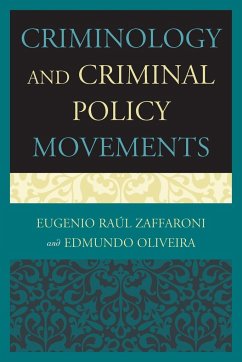- Broschiertes Buch
- Merkliste
- Auf die Merkliste
- Bewerten Bewerten
- Teilen
- Produkt teilen
- Produkterinnerung
- Produkterinnerung
These studies recover the historical roots of thinking that are in conflict with, and critical of, present-day tendencies. Criminological theory over the last few decades has oscillated between extremes: on one side there are calls for increasing the state exercise of punitive power as the only means of providing security, in the face of both urban and international rime; while the other side highlights the need for reducing the exercise of punitive power because of the paradoxical effects that it produces. Useful for academics, practitioners, professionals and students, this book will…mehr
Andere Kunden interessierten sich auch für
![Criminalising Hate Criminalising Hate]() Mark Austin WaltersCriminalising Hate41,99 €
Mark Austin WaltersCriminalising Hate41,99 €![Criminalising Hate Criminalising Hate]() Mark Austin WaltersCriminalising Hate41,99 €
Mark Austin WaltersCriminalising Hate41,99 €![Women's movements and changes in the penal code Women's movements and changes in the penal code]() Rosimar Francelino MacielWomen's movements and changes in the penal code20,99 €
Rosimar Francelino MacielWomen's movements and changes in the penal code20,99 €![Building Complex Temporal Explanations of Crime Building Complex Temporal Explanations of Crime]() Stephen FarrallBuilding Complex Temporal Explanations of Crime57,99 €
Stephen FarrallBuilding Complex Temporal Explanations of Crime57,99 €![Compromises in Democracy Compromises in Democracy]() Compromises in Democracy81,99 €
Compromises in Democracy81,99 €![Doomsday Cults ; The Devil's Hostages Doomsday Cults ; The Devil's Hostages]() Alan R WarrenDoomsday Cults ; The Devil's Hostages16,99 €
Alan R WarrenDoomsday Cults ; The Devil's Hostages16,99 €![Compromises in Democracy Compromises in Democracy]() Compromises in Democracy81,99 €
Compromises in Democracy81,99 €-
-
-
These studies recover the historical roots of thinking that are in conflict with, and critical of, present-day tendencies. Criminological theory over the last few decades has oscillated between extremes: on one side there are calls for increasing the state exercise of punitive power as the only means of providing security, in the face of both urban and international rime; while the other side highlights the need for reducing the exercise of punitive power because of the paradoxical effects that it produces. Useful for academics, practitioners, professionals and students, this book will certainly contribute to a wider awareness in crime prevention and criminal justice.
Hinweis: Dieser Artikel kann nur an eine deutsche Lieferadresse ausgeliefert werden.
Hinweis: Dieser Artikel kann nur an eine deutsche Lieferadresse ausgeliefert werden.
Produktdetails
- Produktdetails
- Verlag: University Press of America
- Seitenzahl: 496
- Erscheinungstermin: 3. April 2013
- Englisch
- Abmessung: 229mm x 152mm x 27mm
- Gewicht: 711g
- ISBN-13: 9780761858522
- ISBN-10: 0761858520
- Artikelnr.: 35211053
- Herstellerkennzeichnung
- Libri GmbH
- Europaallee 1
- 36244 Bad Hersfeld
- gpsr@libri.de
- Verlag: University Press of America
- Seitenzahl: 496
- Erscheinungstermin: 3. April 2013
- Englisch
- Abmessung: 229mm x 152mm x 27mm
- Gewicht: 711g
- ISBN-13: 9780761858522
- ISBN-10: 0761858520
- Artikelnr.: 35211053
- Herstellerkennzeichnung
- Libri GmbH
- Europaallee 1
- 36244 Bad Hersfeld
- gpsr@libri.de
Eugenio Raúl Zaffaroni is professor emeritus at the University of Buenos Aires, vice-president of the International Association for Criminal Law, judge of the Supreme Court of the Argentine Republic, and former general director of ILANUD (Latin American Institute for the Prevention of Crime and Treatment of Offenders, San José, Costa Rica). He holds doctorates in judicial and social sciences and honoris causa from the Universities of Castilla-La Mancha (Spain), Macerata (Italy), Rio de Janeiro, and several other universities in Latin America. He has written books on criminal law and articles in specialized reviews, and received the Stockholm Prize in Criminology 2009. Zaffaroni is a member of the Eminent Jurist Panel of the ICJ (International Commission of Jurists). Edmundo Oliveira is professor in criminal law at University of Amazonia, senior jurist, and doctor with a post-doctorate from the Université La Sorbonne, Paris, France. Oliviera is a member of the International Penal and Penitentiary Foundation and the American Society of Criminology, vice-president of the International Society of Criminology, Consultative Agency of the United Nations and the Council of Europe, general rapporteur of the Permanent Committee for Latin America for Revision of Minimum Rules of the United Nations for Treatment of Prisoners, and the former president of the National Council for Criminal and Penitentiary Policy of Brazil. He is a scientific consultant of the European Institute of the United Nations for Prevention and Control of Crime and a researcher in Comparative Criminal Law at the University of Miami Law School.
Preface. History, Science, and Politics: Criminology's Foundations and
Challenges - Emilio C. Viano Introduction Chapter 1. Seeking the
Enemy: From Satan to Cool Criminal Law - Eugenio Raúl Zaffaroni Chapter 2.
Criminology and Psychiatry: The Trauma of the First Meeting - Eugenio Raúl
Zaffaroni Chapter 3. Criminal Law and Social Protest - Eugenio Raúl
Zaffaroni Chapter 4. Organized Crime: A Frustrated Category - Eugenio Raúl
Zaffaroni Chapter 5. Is a Non-Authoritarian Enemy Criminal Law Possible? -
Eugenio Raúl Zaffaroni Chapter 6. Girardin: Abolitionism between the Second
Empire and the Third French Republic - Eugenio Raúl Zaffaroni Chapter 7.
Globalization and the Current Orientations in Criminal Policy - Eugenio
Raúl Zaffaroni Chapter 8. The "Dangerous Classes": The Failure of a
Pre-Positivist Police Discourse - Eugenio Raúl Zaffaroni Chapter 9. The
Legitimation of Penal Control over the "Strangers" - Eugenio Raúl Zaffaroni
Chapter 10. The Path of Criminology - Eugenio Raúl Zaffaroni Chapter 11.
Can Criminal Law Really Contribute to the Prevention of Crimes Against
Humanity? - Eugenio Raúl Zaffaroni Chapter 12. Crime and Heredity - Edmundo
Oliveira Chapter 13. The Delinquent by Tendency - Edmundo Oliveira Chapter
14. Importance and Usefulness of the Criminological Exam - Edmundo Oliveira
Chapter 15. The Scientific Character of Criminology - Edmundo Oliveira
Chapter 16. Criminology and Criminal Policy - Edmundo Oliveira Chapter 17.
Prison: Past, Present and Future - Edmundo Oliveira Chapter 18.
Justification for Punishment in Judicial Organization - Edmundo Oliveira
Chapter 19. Penitentiary Consensualism - Edmundo Oliveira Chapter 20.
Prison and Human Rights - Edmundo Oliveira Chapter 21. Technological
Progress and Penal Reform - Edmundo Oliveira Chapter 22. Globalization,
Cyberspace and Organized Crime on the Internet - Edmundo Oliveira
Bibliography Index About the Author
Challenges - Emilio C. Viano Introduction Chapter 1. Seeking the
Enemy: From Satan to Cool Criminal Law - Eugenio Raúl Zaffaroni Chapter 2.
Criminology and Psychiatry: The Trauma of the First Meeting - Eugenio Raúl
Zaffaroni Chapter 3. Criminal Law and Social Protest - Eugenio Raúl
Zaffaroni Chapter 4. Organized Crime: A Frustrated Category - Eugenio Raúl
Zaffaroni Chapter 5. Is a Non-Authoritarian Enemy Criminal Law Possible? -
Eugenio Raúl Zaffaroni Chapter 6. Girardin: Abolitionism between the Second
Empire and the Third French Republic - Eugenio Raúl Zaffaroni Chapter 7.
Globalization and the Current Orientations in Criminal Policy - Eugenio
Raúl Zaffaroni Chapter 8. The "Dangerous Classes": The Failure of a
Pre-Positivist Police Discourse - Eugenio Raúl Zaffaroni Chapter 9. The
Legitimation of Penal Control over the "Strangers" - Eugenio Raúl Zaffaroni
Chapter 10. The Path of Criminology - Eugenio Raúl Zaffaroni Chapter 11.
Can Criminal Law Really Contribute to the Prevention of Crimes Against
Humanity? - Eugenio Raúl Zaffaroni Chapter 12. Crime and Heredity - Edmundo
Oliveira Chapter 13. The Delinquent by Tendency - Edmundo Oliveira Chapter
14. Importance and Usefulness of the Criminological Exam - Edmundo Oliveira
Chapter 15. The Scientific Character of Criminology - Edmundo Oliveira
Chapter 16. Criminology and Criminal Policy - Edmundo Oliveira Chapter 17.
Prison: Past, Present and Future - Edmundo Oliveira Chapter 18.
Justification for Punishment in Judicial Organization - Edmundo Oliveira
Chapter 19. Penitentiary Consensualism - Edmundo Oliveira Chapter 20.
Prison and Human Rights - Edmundo Oliveira Chapter 21. Technological
Progress and Penal Reform - Edmundo Oliveira Chapter 22. Globalization,
Cyberspace and Organized Crime on the Internet - Edmundo Oliveira
Bibliography Index About the Author
Preface. History, Science, and Politics: Criminology's Foundations and
Challenges - Emilio C. Viano Introduction Chapter 1. Seeking the
Enemy: From Satan to Cool Criminal Law - Eugenio Raúl Zaffaroni Chapter 2.
Criminology and Psychiatry: The Trauma of the First Meeting - Eugenio Raúl
Zaffaroni Chapter 3. Criminal Law and Social Protest - Eugenio Raúl
Zaffaroni Chapter 4. Organized Crime: A Frustrated Category - Eugenio Raúl
Zaffaroni Chapter 5. Is a Non-Authoritarian Enemy Criminal Law Possible? -
Eugenio Raúl Zaffaroni Chapter 6. Girardin: Abolitionism between the Second
Empire and the Third French Republic - Eugenio Raúl Zaffaroni Chapter 7.
Globalization and the Current Orientations in Criminal Policy - Eugenio
Raúl Zaffaroni Chapter 8. The "Dangerous Classes": The Failure of a
Pre-Positivist Police Discourse - Eugenio Raúl Zaffaroni Chapter 9. The
Legitimation of Penal Control over the "Strangers" - Eugenio Raúl Zaffaroni
Chapter 10. The Path of Criminology - Eugenio Raúl Zaffaroni Chapter 11.
Can Criminal Law Really Contribute to the Prevention of Crimes Against
Humanity? - Eugenio Raúl Zaffaroni Chapter 12. Crime and Heredity - Edmundo
Oliveira Chapter 13. The Delinquent by Tendency - Edmundo Oliveira Chapter
14. Importance and Usefulness of the Criminological Exam - Edmundo Oliveira
Chapter 15. The Scientific Character of Criminology - Edmundo Oliveira
Chapter 16. Criminology and Criminal Policy - Edmundo Oliveira Chapter 17.
Prison: Past, Present and Future - Edmundo Oliveira Chapter 18.
Justification for Punishment in Judicial Organization - Edmundo Oliveira
Chapter 19. Penitentiary Consensualism - Edmundo Oliveira Chapter 20.
Prison and Human Rights - Edmundo Oliveira Chapter 21. Technological
Progress and Penal Reform - Edmundo Oliveira Chapter 22. Globalization,
Cyberspace and Organized Crime on the Internet - Edmundo Oliveira
Bibliography Index About the Author
Challenges - Emilio C. Viano Introduction Chapter 1. Seeking the
Enemy: From Satan to Cool Criminal Law - Eugenio Raúl Zaffaroni Chapter 2.
Criminology and Psychiatry: The Trauma of the First Meeting - Eugenio Raúl
Zaffaroni Chapter 3. Criminal Law and Social Protest - Eugenio Raúl
Zaffaroni Chapter 4. Organized Crime: A Frustrated Category - Eugenio Raúl
Zaffaroni Chapter 5. Is a Non-Authoritarian Enemy Criminal Law Possible? -
Eugenio Raúl Zaffaroni Chapter 6. Girardin: Abolitionism between the Second
Empire and the Third French Republic - Eugenio Raúl Zaffaroni Chapter 7.
Globalization and the Current Orientations in Criminal Policy - Eugenio
Raúl Zaffaroni Chapter 8. The "Dangerous Classes": The Failure of a
Pre-Positivist Police Discourse - Eugenio Raúl Zaffaroni Chapter 9. The
Legitimation of Penal Control over the "Strangers" - Eugenio Raúl Zaffaroni
Chapter 10. The Path of Criminology - Eugenio Raúl Zaffaroni Chapter 11.
Can Criminal Law Really Contribute to the Prevention of Crimes Against
Humanity? - Eugenio Raúl Zaffaroni Chapter 12. Crime and Heredity - Edmundo
Oliveira Chapter 13. The Delinquent by Tendency - Edmundo Oliveira Chapter
14. Importance and Usefulness of the Criminological Exam - Edmundo Oliveira
Chapter 15. The Scientific Character of Criminology - Edmundo Oliveira
Chapter 16. Criminology and Criminal Policy - Edmundo Oliveira Chapter 17.
Prison: Past, Present and Future - Edmundo Oliveira Chapter 18.
Justification for Punishment in Judicial Organization - Edmundo Oliveira
Chapter 19. Penitentiary Consensualism - Edmundo Oliveira Chapter 20.
Prison and Human Rights - Edmundo Oliveira Chapter 21. Technological
Progress and Penal Reform - Edmundo Oliveira Chapter 22. Globalization,
Cyberspace and Organized Crime on the Internet - Edmundo Oliveira
Bibliography Index About the Author








